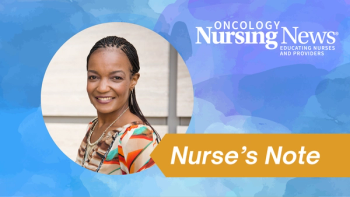
- February 2021
- Volume 15
- Issue 1
Adolescent and Young Adult Patients Face Unique Needs, Challenges
Nurses can create an open dialogue for AYA patients to discuss cancer-related issues.
The National Cancer Institute estimated that in 2020, 89,500 adolescent and young adult (AYA) patients (aged 15 to 39 years) would be diagnosed with cancer.1
Receiving a cancer diagnosis at any age is troubling, but for the AYA population, the impact of cancer differs from that of pediatric and elderly patients. Oncology nurses can help meet the needs of their AYA patients by learning about their concerns and answering questions that may otherwise go unasked.
Donna Bell, MSN, RN, FNP-C, is a nurse practitioner at The University of Texas MD Anderson Cancer Center’s AYA program. The program, which was launched in 2019, provides a wide range of services designed specifically for adolescent and young adult patients with cancer. Oncology Nursing News® spoke with Bell about the important role oncology nurses have when caring for the AYA patient.
“Cancer pulls AYA patients out of their peer groups and subsequently is very isolating,” Bell stated. “Expressing authentic compassion for what they are going through and asking meaningful questions makes it easier for them to talk about issues that matter. Nurses are well suited for these types of interactions.”
Bell offered some suggestions about the questions they might ask: “How are things going at work? What did you do this weekend? Who is your community? Are you having any sexual troubles?” AYAs often worry how cancer and cancer treatment will affect their independence, education, career, and fertility.
Questions related to these areas steer the conversation, guide interventions, and align appropriate referrals. Bell recommends that nurses be familiar with common concerns among AYA patients. “Employ a holistic approach. Look at the whole patient and not just the cancer treatment,” she said.
Patients may be concerned about the effects of cancer or cancer treatment on their ability to have children. Some may not have given the subject any consideration. Conversations about fertility and fertility preservation should be offered to all patients in this age group. These conversations are important and should address risk related to treatment and availability of options such as banking sperm or freezing oocytes.
Nurses can also be instrumental in helping AYA patients construct hope through goal setting, pathways thinking (routes for goal achievement), and overcoming barriers. A resiliency plan for meeting challenges can reduce anxiety and frustration. Hope-based interventions, virtual programming, and virtual support/activity groups have shown promise in improving quality of life, mental and physical health, coping skills, and pain tolerance.2
Another area to address with AYA patients is educational/vocational planning. Referral to a vocational counselor can help patients plan their career trajectory around length of treatment, identify areas of flexibility, and perhaps recommend a change in course. “The disruptive nature of cancer can be an opportunity for growth,” Bell said. “Some young people are spurred to reevaluate their choices and in doing so, discover an interest they had not previously considered, such as a career in nursing or medicine.” The MD Anderson AYA Program website offers information and resources on these and other topics for patients and professionals.3
By taking the time to understand the unique needs of the adolescent and young adult population, nurses can provide assurance to patients that their life matters, their needs matter, and they are not alone.
References
1. Cancer stat facts: Cancer among adolescents and young adults (AYAs) (Ages 15-39). National Cancer Institute. Accessed December 13, 2020.
2. Nicoll I, Lockwood G, Chan RJ, Grundy P, Fitch MI. et al. What do adolescents and young adults perceive is the main challenge during the transition to survivorship? Can Oncol Nurs J. 2020;30(4):309-313. Accessed December 13, 2020.
3. MD Anderson Cancer Center. Adolescent and Young Adult Program website.
Articles in this issue
almost 5 years ago
Cancer Prevention: Why, Who, When, Where, Howalmost 5 years ago
Telehealth: Hope or Hype?almost 5 years ago
Oncology Nurses Can Help Prevent the Preventablealmost 5 years ago
COVID-19 Vaccine and Cancer: What Patients Ought to Knowalmost 5 years ago
Open Discussions Help Nurses Introduce Integrative ServicesNewsletter
Knowledge is power. Don’t miss the most recent breakthroughs in cancer care.































































































